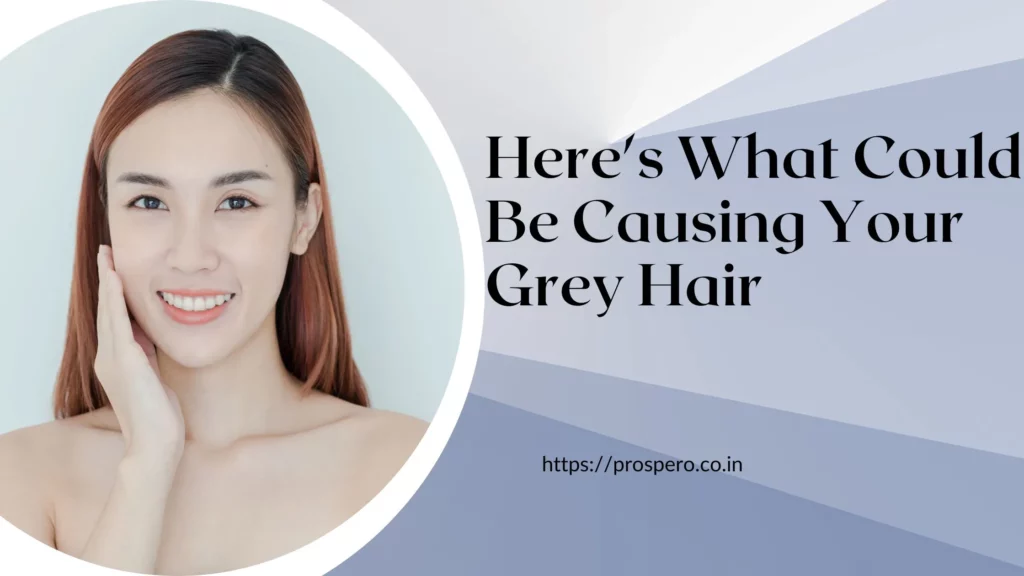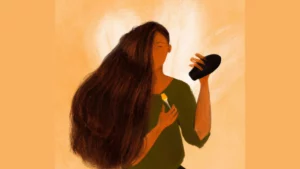We’ve all seen those first few pesky grey hairs poking through our once vibrant manes. For some, it’s a sign of wisdom and experience. But for others, it can be a cause for panic. So what exactly causes grey hair? And is there anything we can do to prevent it?
Let’s take a look at what could be causing your grey hair, as well as how you can embrace your new look.

What are the causes ?
Most people begin to see grey hair appearing in their mid-to-late 30s. While this is the average age for grey hair to start showing up, it can actually happen at any age.
There are a few different factors that can contribute to grey hair. One of the most common is simply getting older. As we age, our bodies produce less melanin, which is the pigment that gives hair its color. This loss of pigment is what causes grey hair.
Other factors that can contribute to grey hair include smoking, stress, certain medical conditions, and certain medications. People who smoke tend to develop it at an earlier age than non-smokers. Stress can also cause premature grey hair. And finally, certain medical conditions and medications can lead to a loss of pigment and grey hair.
If you’re starting to see grey hairs, don’t panic! It’s a natural part of aging for many people. But if you’re concerned about the amount of grey hair you’re seeing, talk to your doctor about possible causes and treatment options.
Is there anything you can do to prevent it?
There are a few different reasons why someone might start to see grey hair. One of the most common causes is simply aging. As we get older, our hair follicles produce less melanin, the pigment that gives hair its color.
This can happen slowly over time, which is why many people first start to see grey hairs in their 30s or 40s. Stress can also cause grey hair, as it can lead to a decrease in melanin production. Other possible causes include vitamin B12 deficiency, thyroid problems, and certain diseases like alopecia universalis.
In most cases, grey hair is nothing to worry about and can simply be considered a sign of aging. However, if you suddenly start to see grey hairs at a young age or if your grey hair is accompanied by other symptoms, it’s best to see a doctor to rule out any underlying health problems.
How can you embrace your new look?
For most people, grey hair is seen as a sign of aging. As the hair follicles produce less melanin, the resulting hair is lighter in color and may even appear translucent. While some people dye their grey hair to maintain a youthful appearance, others choose to embrace their new look.
With the right haircut and styling products, grey hair can be sleek and chic. In fact, grey hair is often associated with wisdom and experience.
So, instead of trying to cover up your grey hair, why not embrace it? Embracing your new look can be a liberating experience that allows you to show the world that you’re comfortable in your own skin. Who knows? You might even start a new trend in the process.
What are some common myths?
One of the most common myths about grey hair is that it is caused by stress. While it’s true that stress can lead to grey hair, it’s not the only factor. Other causes include genetics, nutritional deficiencies, and illness. Another myth is that it is a sign of wisdom.
While there are many wise people with grey hair, there are also many youthful adults and children with grey as well. The color of your hair has nothing to do with your intelligence or level of experience. A final myth is that grey hair cannot be dyed.
This simply isn’t true – it can be dyed just like any other color. However, it’s important to consult with a professional before doing so, as grey hair can be more difficult to dye than other colors. With a little bit of knowledge, you can easily debunk these myths about grey hair.
Should you color your grey hair?
There’s no question that grey hair can be fashionable. Just look at any celebrity magazine and you’ll see plenty of grey-haired stars rocking the latest trends. However, there’s also no denying that grey hair can be associated with old age.
For many people, the decision of whether or not to color their grey hair is a difficult one. On the one hand, they may want to embrace their grey streaks and celebrate their wisdom and experience. On the other hand, they may worry that it will make them look stale and out-of-touch.
Ultimately, the decision of whether or not to color grey hair is a personal one. Some people love the way it looks and feel, while others prefer to hide their grey streaks. Whichever option you choose, there’s no need to feel ashamed or embarrassed – it is natural, after all!
conclusion:
Ultimately, the decision of whether or not to color hair is a personal one. Some people love the way it looks and feel, while others prefer to hide their grey streaks. Whichever option you choose, there’s no need to feel ashamed or embarrassed – grey hair is natural, after all!
If you’re looking for a way to stop grey hair, Folifort may be the perfect solution for you! This natural supplement helps to reduce grey hair and promote healthy hair growth. Give it a try today and see the difference!



